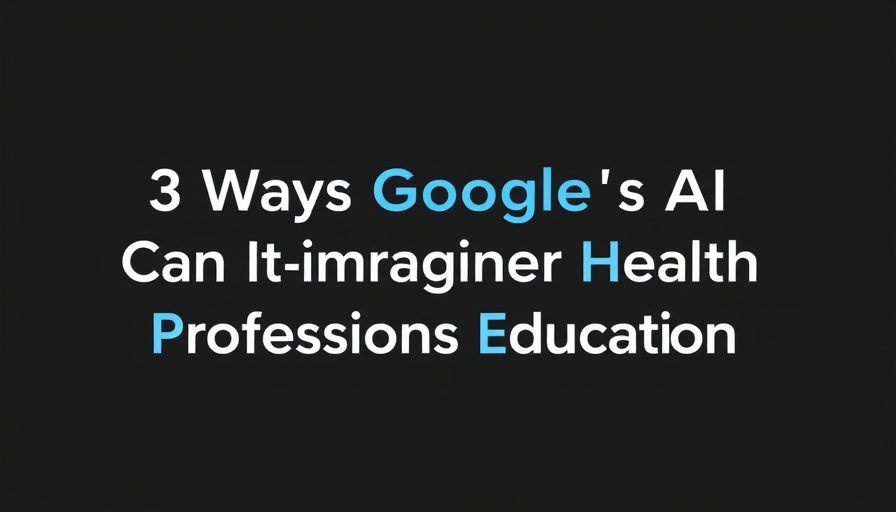
The Role of AI in Transforming Medical Education
In recent years, the integration of artificial intelligence (AI) into various fields has sparked significant conversations around its future potential. One of the most promising areas is healthcare, where the demand for skilled professionals continues to rise. As highlighted in studies from Google Research, AI has the potential to reshape medical education, bridging the gap created by a looming workforce shortage.
An Urgent Need: Addressing Healthcare Workforce Deficiencies
With projections indicating a critical shortage of over 11 million healthcare workers by 2030, the urgency for innovative solutions has grown. Educational institutions are now at a pivotal crossroad, needing to adopt technologies that can enhance learning and prepare the next generation of healthcare providers. Google's efforts in leveraging AI aims not just to educate but to inspire a new wave of medical professionals driven by personalized, adaptive learning experiences.
Google's Innovative Approach to Learner-Centered AI
Central to Google’s strategies is a focus on learner-centered design, a method crucial for the effective development of AI tools tailored for educational settings. By employing a participatory approach that involves medical students, educators, and UX designers, Google has been able to create solutions that resonate with users' needs. The qualitative research conducted has led to the development of AI prototypes that provide crucial support in clinical reasoning, ensuring that each learner's path is uniquely catered to their learning style.
AI Educators: More Than Just Tutors
The studies conducted by Google indicate a strong preference among medical students for AI tools that operate similarly to human tutors. These AI models aren't merely data crunchers; they facilitate learning by giving instant feedback and promoting critical thinking. With advancements seen in models like LearnLM, educators are recognizing the importance of behavior that reflects good tutoring. AI offers a unique level of engagement, catering to individual learning styles and offering constructive insights that traditional learning methods may overlook.
Real Results: User Experiences with AI Learning Tools
The power of AI in medical education is best illustrated through user experiences. In a qualitative user study involving medical students and residents, participants engaged with AI tutor prototypes designed for enhancing clinical reasoning skills. Feedback from these sessions showed a marked improvement in user engagement and knowledge acquisition. This not only highlights the potential for better learning outcomes but also emphasizes the importance of integrating technology in educational curricula.
Looking Towards the Future: Opportunities and Challenges
As AI technology continues to evolve, it opens up a myriad of opportunities for future innovations in health education. Yet, the path is not devoid of challenges. Ethical considerations surrounding data privacy and the role of human educators need careful deliberation. The continued collaboration between AI developers, healthcare professionals, and educators is paramount to ensure that these tools augment rather than replace the critical human element in education.
Practical Insights: Adoption Strategies for Businesses
For small and medium-sized businesses in the health sector, integrating AI into training programs could be a game-changer. Emphasizing AI’s adaptability, businesses can cultivate a healthcare workforce that is not only skilled but is also equipped to tackle modern-day healthcare challenges. Incorporating AI tools into existing educational frameworks can enhance training outcomes and improve retention rates among healthcare professionals.
Conclusion: The New Era of Health Professions Education
The importance of continuously evolving educational practices to meet healthcare needs cannot be overstated. As we strive to prepare future healthcare professionals, embracing AI will play a vital role in shaping effective learning methodologies. The potential benefits of advanced AI integration into medical education underscore the need for early adoption and continuous exploration in this space.
If you want to remain at the forefront of medical education innovation, consider how AI tools can be integrated into your training programs, helping you nurture skilled professionals ready to meet the challenges of tomorrow's healthcare landscape.
 Add Row
Add Row  Add
Add 



Write A Comment